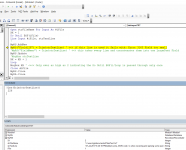Cotswold
Well-known member
- Local time
- Today, 06:54
- Joined
- Dec 31, 2020
- Messages
- 1,007
Hello All, I need to read various plain TEXT files into an Access Table but am unable to get it to read the lines separately. I know that using the Access TransferText function will do the job but there will be different text files that I need to handle and I would rather decide in the code how to handle them, instead of creating a new Specification for each new file that arises. Which will not be practical in this instance.
I have extracted the code I have an issue with. Is anyone able to tell me why the following code will only import all of the contents of a text file into one LargeText field rather than each line into separate fields?
Line 18 fails with Error 3163 Field too small to accept data. (with lengths less than 60 characters each in the text file)
Line 19 works as all the lines in PlainText.txt File are concatenated and saved in the Table T1030 FieldMemo which is a LongText type.
The text lines in the text file will not be longer than 128 and there will usually be from about 20 to up to 150 lines of text to read in.
I have extracted the code I have an issue with. Is anyone able to tell me why the following code will only import all of the contents of a text file into one LargeText field rather than each line into separate fields?
Line 18 fails with Error 3163 Field too small to accept data. (with lengths less than 60 characters each in the text file)
Line 19 works as all the lines in PlainText.txt File are concatenated and saved in the Table T1030 FieldMemo which is a LongText type.
The text lines in the text file will not be longer than 128 and there will usually be from about 20 to up to 150 lines of text to read in.
Code:
Private Sub btnImportTXT_Click()
'
001 ' Access Table
002 Dim MyDb As DAO.Database
003 Dim MyRS As DAO.Recordset
004 Dim XX As Integer
005 Set MyDb = CurrentDb
006 Set MyRS = MyDb.OpenRecordset("T1030")
007 '--------- Text txt
008 Dim strFileName As String: strFileName = "c:\Path\Path\PlainText.txt" ' hard coded in example
009 Dim strTextLine As String
010 Dim iFile As Integer: iFile = FreeFile
011 '
012 Open strFileName For Input As #iFile
013 XX = 1
014 Do Until EOF(iFile)
015 Line Input #iFile, strTextLine
016 '
017 MyRS.AddNew
018 MyRS("Field128") = Trim(strTextLine) ' <<< if this line is used it fails with: Error 3163 Field too small
019 'MyRS("FieldMemo") = Trim(strTextLine) ' <<< this takes every line and concatenates them into one LargeText Field
020 MyRS.Update
021 'MsgBox strTextLine
022 XX = XX + 1
023 Loop
024 MsgBox XX ' <<<< Only ever as high as 2 indicating the Do Until EOF()/Loop is passed through only once
025 Close #iFile
026 MyRS.Close
027 MyDb.Close
'
End Sub ' btnImport()
***********
Last edited:

